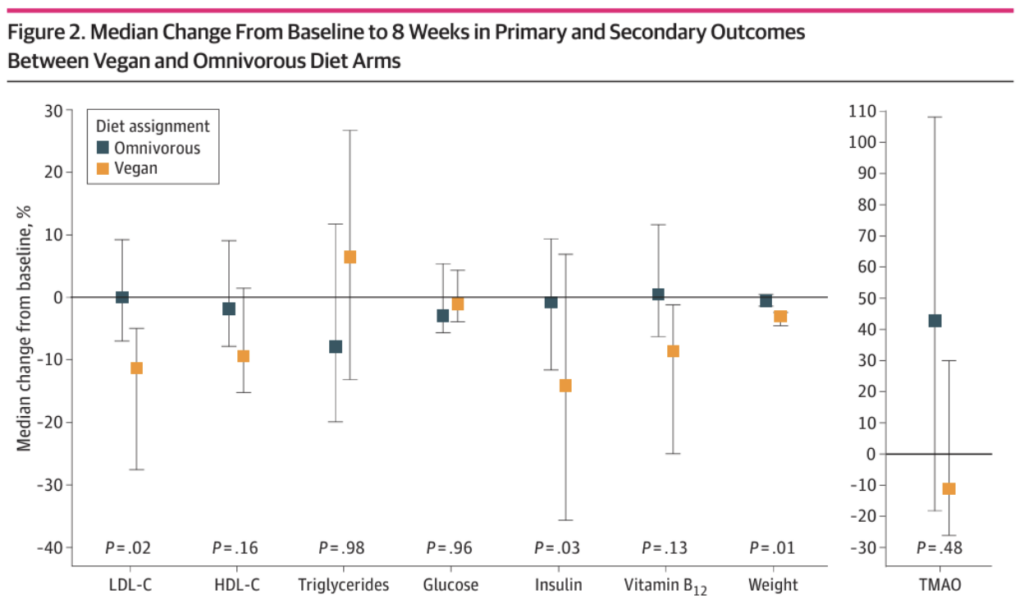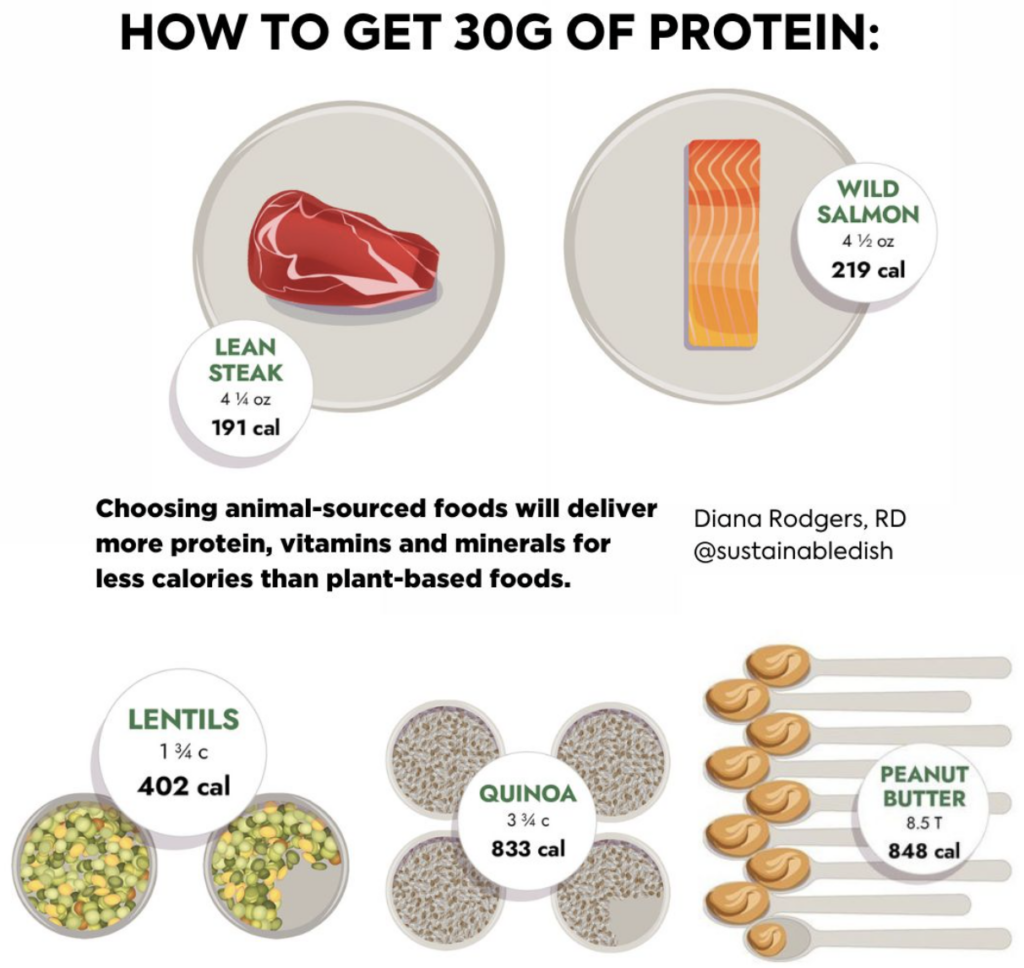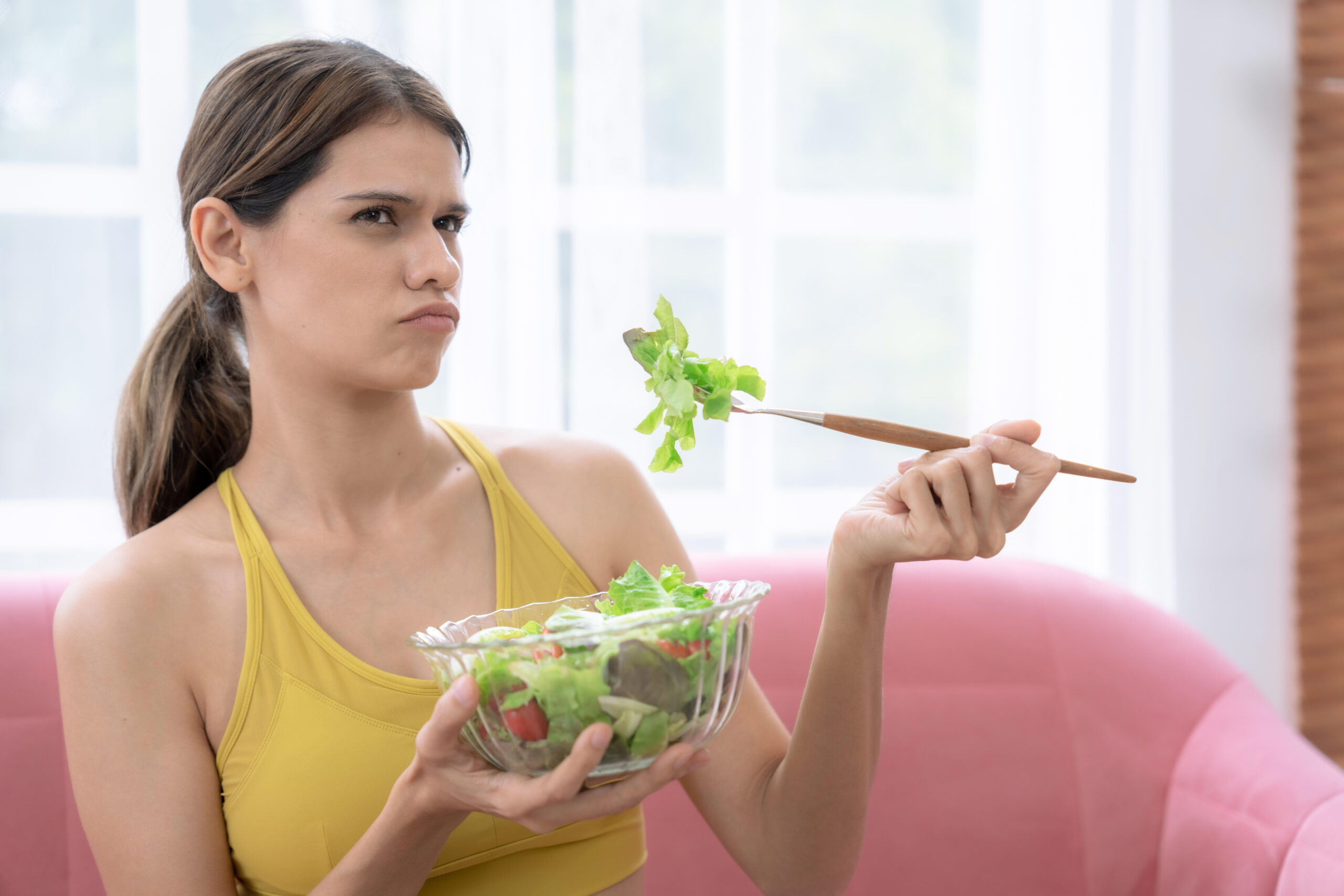It seems like each year, Netflix serves us up with yet another poorly done slice of vegan propaganda. This latest version, “You Are What You Eat” certainly met my low expectations. I didn’t even want to watch it because I knew what I’d be seeing, but so many people were emailing and sending me messages via instagram asking what I thought. OF COURSE it was terrible.
All of these films seem to contain the same ingredients: a mix of shaky science, unbalanced anti-livestock viewpoints, and lots of random storylines that make no sense. If you were someone swayed to consider going vegan after watching this, I get it. I also care deeply about health, sustainable food systems and animal welfare, and am appalled at how sick we’ve become and how some livestock are treated.
These films are quite clever in their use of lies and distortions and do try to tug on your heartstrings when it comes to meat production. However, once you realize that humans require meat, and that there is no “deathless” food system, then it will become more clear how wrong this logic is.
In fact, this is why Robb Wolf and I decided to write the book Sacred Cow, which dismantles each anti-meat argument piece by piece. And for those who don’t want to read it all in a book, I directed and produced the companion film, Sacred Cow.
Since my main focus these days is on my non-profit, the Global Food Justice Alliance (which advocates for the right for all people to have access to nutrient-dense foods like meat), I’m spending less time these days writing blog posts. It would take far too much time to write a point-by-point breakdown of the series, so instead I’m going to focus on a few parts that annoyed me the most…
The Study:
The interpretation and claims from the study were incredibly flawed. This series was based on a research project you can find here.
Let’s break it down to see if the conclusions in the film are warranted.
The conclusion of the study is as follows:
“In this randomized clinical trial of the cardiometabolic effects of omnivorous vs vegan diets in identical twins, the healthy vegan diet led to improved cardiometabolic outcomes compared with a healthy omnivorous diet. Clinicians can consider this dietary approach as a healthy alternative for their patients.”
But here’s what actually happened in the study:
The researchers randomly assigned 22 sets of twins to either an omnivore or vegan diet. For the first four weeks, the meals were sent to the subjects, and for the second four weeks, they had to cook for themselves. The researchers then examined the blood work and weight of the participants before and after the 8 weeks.
Now, are the conclusions above warranted?
Here are the findings: the vegan group had a statistically significant decrease in LDL-C and had a statistically significant amount of weight loss compared to the omnivore group. My opinion is that those results don’t come anywhere close to warranting the conclusion above and those made in the film. Let me explain…
First, those two values weren’t the only thing the researchers measured. Here is a graphic from their study showing the change from baseline in each group:

Glucose and insulin were also slightly reduced in the vegan group which is a positive thing. However, the vegan group had a decrease in Vitamin B12, HDL-C, and an increase in triglycerides. Those are all negative changes. Those changes were not statistically significant but still trending in different directions as shown above.
Now check out this table:

What do you see? The vegan diet was about 200 calories lower for the duration of the trial.
We know that changes in insulin levels, glucose levels, and weight are expected with less calories, so there is no way that the researchers can make any claim that the composition of the diet could change those markers while different energy intake levels were present.
That means we are really only left with the LDL-C change from the trial. How important is that?
The change in LDL cholesterol was small. First you need to know that a 15 point drop in LDL is not really that much. Depending on the day, your cholesterol level varies significantly and single measurements are not reliable. Also, there is much debate if an increase in LDL-C on its own is detrimental to cardiometabolic health without considering other markers. Which takes us to the next point.
There were several negative changes in the Vegan Group. HDL-C went down and triglycerides went up. Those changes are known risk factors for increased heart disease. So, you trade one good change (LDL) for two bad changes (HDL and Triglycerides). Plus, all those changes were over only 8 weeks so we don’t know if those trends will continue or not.
What do you think about the conclusion now? Here it is again:
“The healthy vegan diet led to improved cardiometabolic outcomes compared with a healthy omnivorous diet.”
I think you’ll agree that is a massive stretch and can’t be proved at all from this study. Yet this is the message that is paraded as a fact in the documentary.
Or how about this part: “Clinicians can consider this dietary approach as a healthy alternative for their patients.”
What about the changes to Vitamin B-12? B-12 levels went down in every vegan participant and as much as 25% in one. Vitamin B-12 is a critical nutrient for brain function and deficiencies can lead to depression, something more common in vegan populations than in omnivores. There are no true sources of B12 on a vegan diet, and “vegan” supplements for B12 actually increase your need for the vitamin. Deficiencies are quite serious, especially to pregnant women and babies. In fact, B12 deficiency can cause permanent brain damage to babies. Why isn’t that talked about in the film?
While the vegan group lost weight, much of that weight was muscle. It’s important to consider this when looking at research claims when it comes to weight loss. You want to see people losing body fat and maintaining or gaining muscle, which is what happened to the omnivore group, not the vegans. They ate more protein, which supports muscle growth.
Based on these facts, as a dietitian, I don’t agree that healthcare practitioners should be urging their patients to go vegan. We simply don’t have the right evidence to support it.
Here are the last few things to consider:
Ideological conflicts of interest: Author Christopher Gardner, Ph.D. receives funding from Beyond Meat (which was disclosed on the paper), but he did not disclose his ideological convictions to a plant-based diet.
On his Stanford webpage, Gardner states:
“In the past few years the interests of my research group have shifted to include three additional areas of inquiry. One of these is Stealth Nutrition. The central hypothesis driving this is that in order for more effective and impactful dietary improvements to be realized, health professionals need to consider adding non-health related approaches to their toolbox of strategies. Examples would be connections between food and 1) global warming and climate change, 2) animal rights and welfare, and 3) human labor abuses (e.g., slaughterhouses).”
* I would like to point out that although there are labor issues happening in slaughterhouses, there are way more human rights and labor abuses happening in the harvesting of crops. Pesticide exposure, heat stress, lack of clean drinking water, child labor, and human trafficking are just some of the issues facing farm workers in America. However, I never see vegan activists fighting for human rights in our food system – they seem much more concerned with animal’s rights instead. I agree there are issues to be addressed with how we raise livestock, but let’s not pretend that eating plant foods releases you from unintentionally causing harm.
Adherence was self-reported. We know that self-reported food intake and food frequency questionnaires are unreliable and should never be used to make any sort of scientific claim because people forget, or they just lie.
People aren’t satisfied with a vegan diet. Interestingly, only one vegan participant out of the group reported that they would continue eating a vegan diet after the study, and the vegan participants reported “lower dietary satisfaction” than the omnivores.
In summary, most of the good effects from the vegan diet are likely explained by less calories. Or at least, the effects can’t be claimed without considering the caloric difference. The one change in LDL is negated by the negative changes in HDL and triglycerides. And most of the vegan participants were also on their way to a serious vitamin deficiency.
I think you’ll agree, this study isn’t quite the home-run the film claims it to be. The conclusions are vastly overstated, and there are some serious flaws in the study.
Now, on to the show…
The Show:
The docuseries attempted to follow a story arch, but there were a lot of weird rabbit holes it went down that didn’t seem to make sense. There seemed to be an over emphasis on the vegan fake cheese company Miyoko’s, without the same attention halo to fake burger companies. I did like the attention to food safety in the scene where the women prepared raw chicken and the blue light showed raw chicken all over the kitchen, but people also get serious food poisoning from unwashed vegetables, raw flour and even cooked rice, which was never mentioned.
Meat doesn’t equal fast food. I found it irritating how almost every time the experts in the film mention meat, they showed an image of fast food. There are plenty of healthy ways to balance a plate that includes meat, and at the same time, there are lots of ultra-processed foods that don’t include meat. A piece of steak with a salad and roasted broccoli is not the same as a fast food burger with a side of fries and an extra large soda, yet we’re often conditioned to think that meat equals unhealthy meals. In the case of the fast food burger meal, it’s the bun, fries and sugary beverage that make it unhealthy, not the actual burger patty.
Humans have been eating meat for about 3.5 million years. Yet, it’s only been in the last century that we’ve been so inundated with such high volumes of ultra processed junk food which has taken over the middle of the grocery store. These foods are “hyper-palatable” meaning they stimulate us to overeat them, and they contain a lot of calories. They’re so far removed from what our ancestors ate. Using common sense, wouldn’t modern food be responsible for our recent and dramatic rise in lifestyle related diseases like type 2 diabetes and obesity?
Less or no meat is not the answer, better nutrition is. Meat is a high quality source of protein, healthy fats, plus vitamins and minerals which are difficult or impossible to obtain through plant-based sources. In fact, the most common nutrient deficiencies worldwide include iron, vitamin B12, vitamin A and zinc – all of which are best found through animal sourced foods, not on a vegan diet.
The right diet for you is one that keeps you feeling full, yet not overconsuming calories. Protein is the most satiating macronutrient, and animal-sourced proteins like seafood, chicken and steak are the lowest calorie options compared to unprocessed plant-based foods like lentils, black beans and nuts.
For example, you can get 30g of protein from 4.5 oz of steak for 191 calories, 1 ¾ cups of lentils for 402 calories, or 8 TBS of peanut butter for 848 calories. So if weight loss is the goal, clearly avoiding peanut butter and focusing on foods like shrimp and steak is a better option.

Want to learn more about how much of different foods you need to eat to get 30g of protein and how many calories it is? Get my free grocery and protein guide here.
The best diet is one that gives you the right balance of nutrients through real food, not one that requires synthetic supplements.
The optimal way to eat is to follow a plan that you enjoy and will want to continue. In the study, the majority of people preferred the diet containing meat. In fact, only one of the people said they preferred eating a vegan diet, and overall, 85% of people on a vegan diet give it up after 3 months.
That says something. Humans are omnivores and a real food omnivore diet is what we are designed to thrive on.
If you want to learn how to eat a fulfilling, nourishing, and more sustainable diet, consider taking my course, Sustainavore. You’ll learn to calculate how much protein your body needs, the best ways to get that protein, which carbs and fats are ideal, and I also include modules explaining environmental impact and ethical considerations. The normal price of the course is $497, and for this month only, use code protein24 to get $400 off the course – only $97!
As a dietitian I’ve helped thousands of people learn the right way to eat for their bodies. And as someone who has spent 18 years living and working on organic farms, I sincerely care about your health, animal welfare and the health of our planet. A vegan diet is not the solution.
So check out my book, Sacred Cow, my film Sacred Cow, or my course, Sustainavore today. And if you’d like to join my mission to push back against the anti-meat narrative and make sure underserved populations have access to meat, check out my non-profit, the Global Food Justice Alliance here.









2 thoughts on “What “You Are What You Eat” Got Wrong”
The one big point that hit me was an 8 week study – really – I am sure long term problems in the body as a consequence of diet do not arise in just 8 weeks. We often feel better when we change our diet, just because of the change… you and your body get interested and you get hormone changes just because of that. To judge how a diet is ‘In The Long Term’, on an 8 week study seems really problematic to me.
I am not a dietitian, just someone who has spent years trying to work out how to have a healthy body and gut – after being vegetarian for 25 years!! being vegetarian was the worst thing I have done to my body… and it has taken 20 years to 1) work out what was going on and 2) to repair the damage that had been done.
Good quality holistically grown/regeneratively grown meat has been my best friend in my health journey. Remember, if you care about animals, well managed animals for meat production provides habitat for wildlife… mono-cropped plant food can NEVER provide ongoing habitat for wildlife, it destroys habitat and it kills any animals that happen to try to make a home in the crop fields – think harvesters!
A news story about the study showed results from a single twin pair. What struck me was that both were in excellent physical condition but that during the short 8 week period the vegan twin lost muscle mass while the omnivore twin gained significant muscle mass. We have been led to believe (some days) that increasing percent lean body mass is “healthy”. The alternative is attrition of body lean mass which must be replaced either by fat or water.